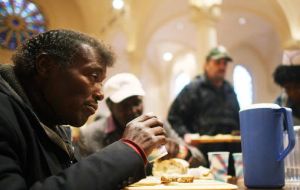MercoPress. South Atlantic News Agency
In the even of Vatican top official visit, Cuba frees paraplegic political dissident
 The Cuban regime of Raúl Castro is also making true that “there is no such thing as a free lunch”
The Cuban regime of Raúl Castro is also making true that “there is no such thing as a free lunch” The Cuban government has freed a jailed dissident and moved six others to jails closer to their homes. Senior Catholic clergymen had urged Cuban president Raul Castro to release Ariel Sigler, 47, on humanitarian grounds.
Mr Sigler became paraplegic in jail and his family had serious concerns for his health. He was arrested in 2003 as part of a government sweep on dissidents, and found guilty of treason.
Sigler's release is the latest in a series of minor concessions following talks between Cuban officials and Catholic Church leaders. The move comes just days before the Vatican's Foreign Minister, Dominique Mamberti, is due to travel to Havana.
Arriving in his home town of Pedro Betancourt, Mr Sigler told reporters he felt a mix of happiness and sadness. “I'm sad because I can't share this moment with my mother, who died five months ago and because more than half of our companions are still in prison,” he said.
His arrest in 2003, along with that of 74 other dissidents, became known among opposition groups as “black spring”.
The six prisoners being transferred were among those arrested in 2003. One of them is Hector Maceda, whose wife Laura Pollan leads the pressure group Ladies in White. The group has been holding protest marches to demand the dissidents' release.
Ms Pollan said the Ladies in White were pleased about the transfers but pointed out that their ultimate goal, the release of their relatives, had not yet been achieved. The transfer is the second this month, bringing the number of those moved to 12. According to human rights organization in Cuba there are an estimated 200 political prisoners in the island of which 30 in very serious medical conditions.
Meanwhile the government announced it will expand a program that shuts workplace cafeterias while giving people stipends to buy food on their own. The Communist Party newspaper Granma reported Friday that a pilot program begun in October to eliminate free lunches for 2,800 government workers will grow to include another 225,000 as of July 1. The move will save the cash-strapped country 27 million USD.
The reform is being extended to state bank workers, employees at the tourism, transportation, foreign investment, basic industry and foreign relations ministries, as well as workers at the government retail giant CIMEX and the Office of the City of Havana Historian and the Cuban Chamber of Commerce.
The new round of cafeteria closings means that in all, about 5 percent of Cuba's official work force of nearly 5 million will have to fend for themselves at lunch time, though the government will provide about 70 US cents per work day to help pay for it.
The reform represents a radical change in philosophy for the government, which has traditionally micromanaged many aspects of Cubans' lives — from monthly ration books to determining who can own a car.




Top Comments
Disclaimer & comment rulesCommenting for this story is now closed.
If you have a Facebook account, become a fan and comment on our Facebook Page!